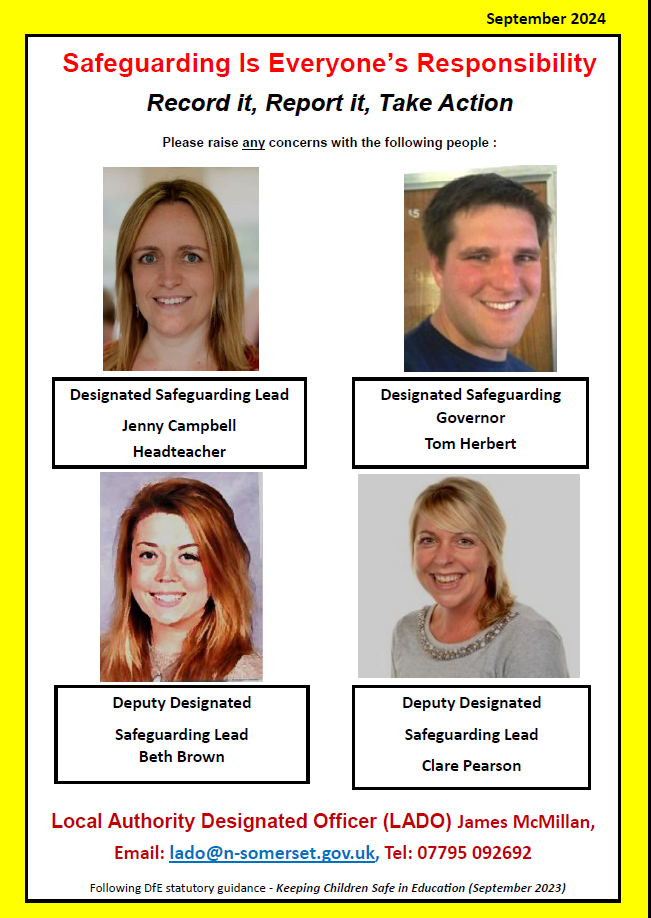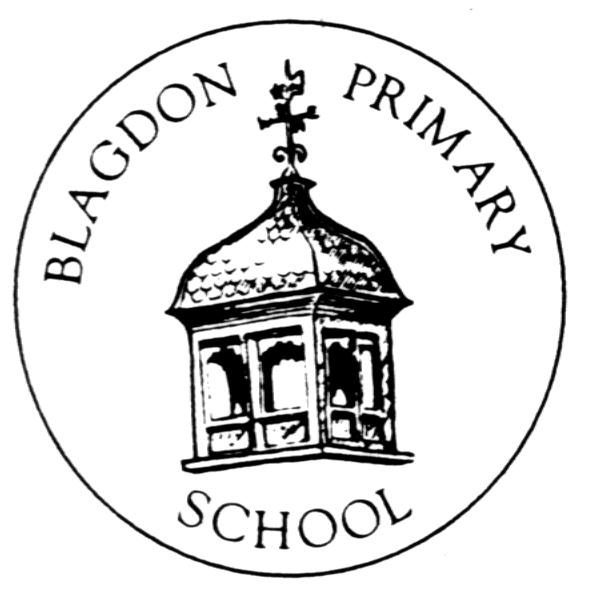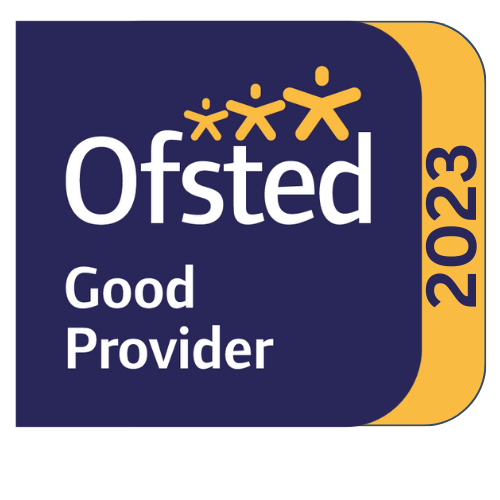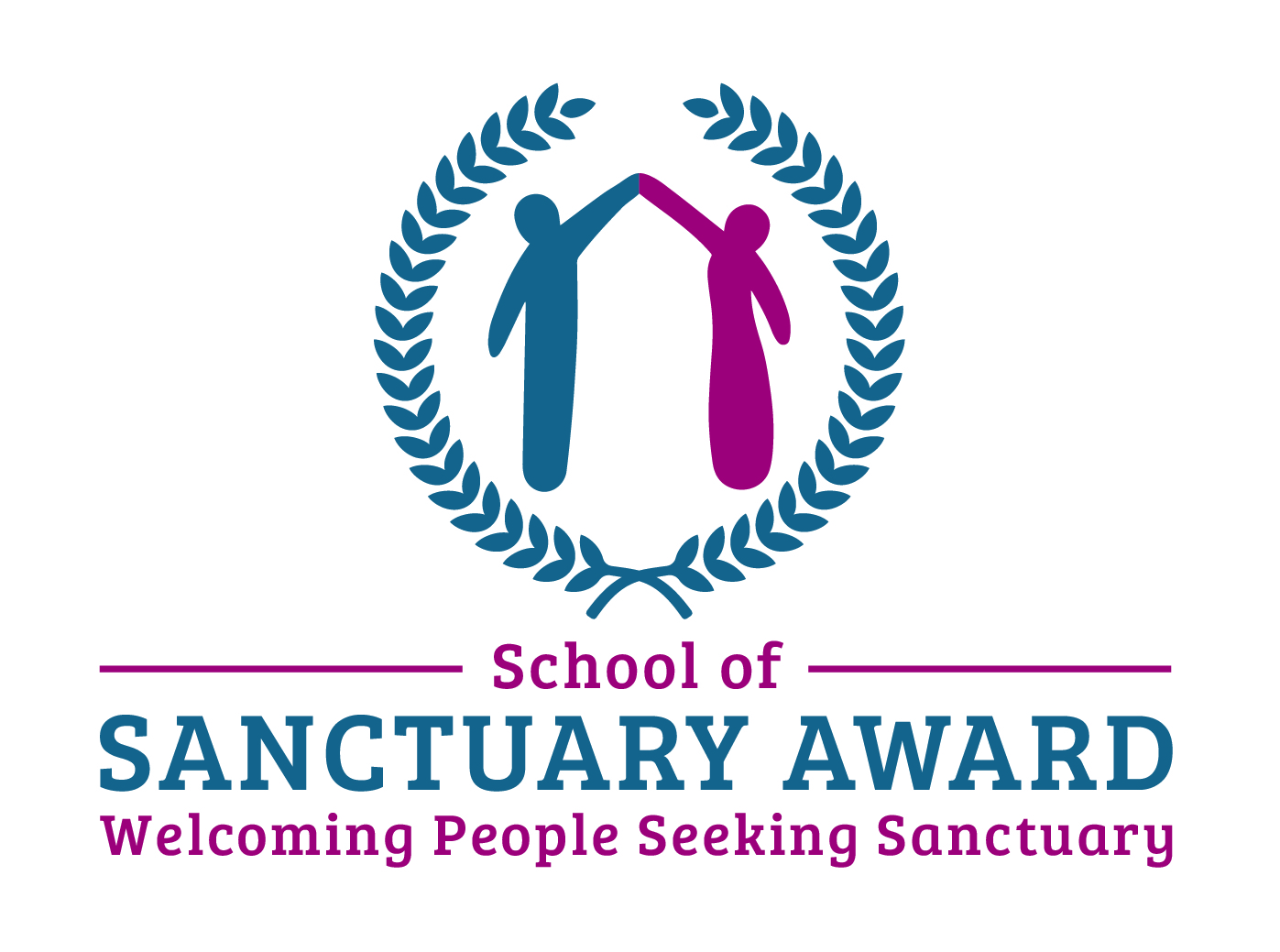Safeguarding at Blagdon
If you are worried about a child, young person or adult, who you think is being abused or neglected, email now on BlagdonDSL@blagdonprimaryschool.com
Our school is dedicated to looking after all our children the best we possibly can. Safeguarding covers children’s physical, social and emotional well-being and runs alongside our work on Health and Safety and E-safety. We have a planned curriculum for safeguarding, which teaches your child how to keep themselves safe and what to do if any adult makes them feel unsafe.
Part of our responsibility in this area is to work with outside agencies such as Educational Welfare or Social Care to make sure all pupils are kept safe. This means that at times we are obliged to pass on concerns or information to these agencies. The school will always do this in consultation with parents unless to do so could put a child at risk
The Designated Safeguarding Lead at Blagdon Primary School is Mrs Jenny Campbell, our Headteacher. As well as Mrs Jenny Campbell, Miss Beth Brown, and Miss Clare Pearson are our Deputy Safeguarding Officers. If you need to speak with any of these members of staff, and you are not sure how to contact them, please ask at the School Office. Our Safeguarding Governor is Mr Tom Herbert who can be contact on tom.herbert@blagdonprimaryschool.com.
Mrs Campbell is also our Mental Health Lead and Young Carers point of contact.
Any concerns about a child's welfare or wellbeing should be discussed with Mrs Campbell, Miss Brown, Miss Pearson or Mr Herbert immediately.
Email BlagdonDSL@blagdonprimaryschool.com
Please be aware, all visitors to Blagdon Primary School will be requested to leave their mobile phones in the secure lockers outside the School Office.

PREVENT
Prevent is about safeguarding people and communities from the threat of terrorism. Prevent is 1 of the 4 elements of CONTEST, the Government’s counter-terrorism strategy. It aims to stop people becoming terrorists or supporting terrorism.
Incidents of extremism and radicalisation are rare and as such when they do occur, make the news. As with all safeguarding issues, it is important to be vigilant, and not complacent, but also not to panic.
What is extremism and radicalisation?
Prevent defines extremism as: “vocal or active opposition to fundamental British values, including democracy, the rule of law, individual liberty and mutual respect and tolerance of different faiths and beliefs. We also include in our definition of extremism calls for the death of members of our armed forces”.
Radicalisation is defined by the UK Government within this context as “the process by which a person comes to support terrorism and extremist ideologies associated with terrorist groups.”
However…
We live in a wonderfully diverse world, with both differences and similarities to celebrate. Exploring religious and different social beliefs, in a peaceful and non-violent way, is part of growing up and should not be confused with something more sinister. The best way to PREVENT extremism and radicalisation is by open discussion and increased understanding of each other.
As a parent…
- You know your child better than anybody else. Having open, honest conversations on a regular basis will allow your child to explore new ideas in a safe environment.
- Talk to your child about their online viewing. Social media such as YouTube and Facebook can be used to groom children towards a certain point of view.
- Discuss different points of view concerns topics in the news, modelling that there is always more than one point of view.
- Encourage your child to take an active part in their local community. This could be part of a sports club, social group, volunteering. Getting out, meeting and talking to people around you helps to understand and become part of a community.
As a school…
- All staff have had Prevent training.
- We have updated our safeguarding procedures to reflect statutory requirements in the Government’s Counter-Terrorism and Security Act 2015.
- We have direct contact with the Local Prevent Officer and other external professionals to receive on-going support and two way communication.
- Students are encouraged to discuss and explore issues.
- If you have any concerns that someone you know may be at risk of radicalisation, please contact the local police on 101. If your concern is of an URGENT nature please dial 999 or the Anti-Terrorist Hotline 0800 789 321. If you have a concern about a student attending this school please contact Mrs Campbell, the Designated Safeguarding Lead.
For more information about the Government’s Safeguarding Prevent Agenda, please look at the website launched by Nicky Morgan – Educate against Hate This is a resource for school leaders, staff and parents. It is designed to give advice on preventing extremism and helping to protect children and young people from radical views.
Female Genital Mutilation (FGM) and Honour based Violence (HBV)
Female genital mutilation is the mutilation of the external female genitalia for non-medical reasons. It is often referred to as female circumcision, ‘cutting’ or ‘sunna’.
Government Statement opposing FGM
Female Genital Mutilation (FGM) is child abuse and an extremely harmful practice with devastating health consequences for girls and women. Some girls die from blood loss or infection as a direct result of the procedure. Some women who have undergone FGM are also likely to find it difficult to give birth and many also suffer from long-term psychological trauma.
UK Law
- Female genital Mutilation is a crime in the United Kingdom. Even if a girl is taken abroad to undergo FGM, it is still a crime in the UK if the mutilation is done by a UK national or a UK resident.
- It is also a crime if a UK national or resident assists or gets a non-UK national or resident to carry out FGM overseas on a UK national or resident.
- If FGM is committed against a girl under the age of 16, each person who is responsible for the girl at the relevant time is guilty of an offence.
Criminal Penalties
Anyone found guilty of an FGM offence – or of helping somebody commit one – faces up to 14 years in prison, a fine, or both. Anyone found guilty of failing to protect a girl from risk of FGM faces up to 7 years in prison, a fine, or both.
Support
If you are worried that this might happen to you or someone you know, you can speak to a member of the safeguarding team in school. They will be able to help and support you.
Alternatively, you can report this abuse by contacting one of the following:
- If there’s immediate danger or if you or someone you know is in immediate danger of FGM, contact the police.
- Call 999 to report emergencies or 101 for non-emergencies.
- You should also contact the Foreign and Commonwealth Office if you know a British national who’s already been taken abroad.
- Foreign and Commonwealth Office telephone: 020 7008 1500
If you or someone you know is at risk contact the NSPCC anonymously if you’re worried that a girl or young woman is at risk or is a victim of FGM.
NSPCC FGM Helpline email: fgmhelp@nspcc.org.uk
Telephone: 0800 028 3550
Child Sexual Exploitation
Sexual exploitation can take many forms from the seemingly ‘consensual’ relationship where sex is exchanged for attention/affection, accommodation or gifts, to serious organised crime and child trafficking. What marks out exploitation is an imbalance of power within the relationship. The perpetrator always holds some kind of power over the victim, increasing the dependence of the victim as the exploitative relationship develops.
Sexual exploitation results in children and young people suffering harm, which can cause a significant damage to their physical and mental health. Whilst some children can be supported to make a recovery, others may suffer serious life-long impairments which may, on occasion, lead to their death.
Any child or young person can be a victim of sexual exploitation, but children are believed to be at greater risk of being sexually exploited if they:
- are homeless
- have feelings of low self-esteem
- have had a recent bereavement or loss
- are in care
- are a young carer
However, there are many more ways that a child may be vulnerable to sexual exploitation and the signs that a child is being exploited are not easy to spot.
Signs of Grooming and Sexual Exploitation
Signs of child sexual exploitation include the child or young person:
- going missing for periods of time or regularly returning home late
- skipping school or being disruptive in class
- appearing with unexplained gifts or possessions that can’t be accounted for
- experiencing health problems that may indicate a sexually transmitted disease
- having mood swings and changes in temperament
- using drugs and/or alcohol
- displaying inappropriate sexualised behaviour, such as over-familiarity with strangers, dressing in a sexualised manner or sending sexualised images by mobile phone (“sexting”)
- they may also show signs of unexplained physical harm, such as bruising and cigarette burns
If you have a concern about a child, please contact Mrs Campbell, the Designated Safeguarding Lead in school, as above.
Enough Campaign
Everyone can do something to challenge the abuse of women and girls.
Abuse takes many forms. It can be emotional, physical, sexual or financial. It can be words or actions. At home or in the street. It can be inflicted by a partner, ex-partner, family member, colleague, friend or stranger. It can be in person, through technology and online.
Whatever form it takes, abuse is never justified. Any behaviour that demeans, frightens or distresses is abuse. It has to stop.
Knowing what abuse is helps us all recognise it when it happens. We can all do something to keep women and girls safe.
For further information about this Government campaign please go to their website https://enough.campaign.gov.uk










